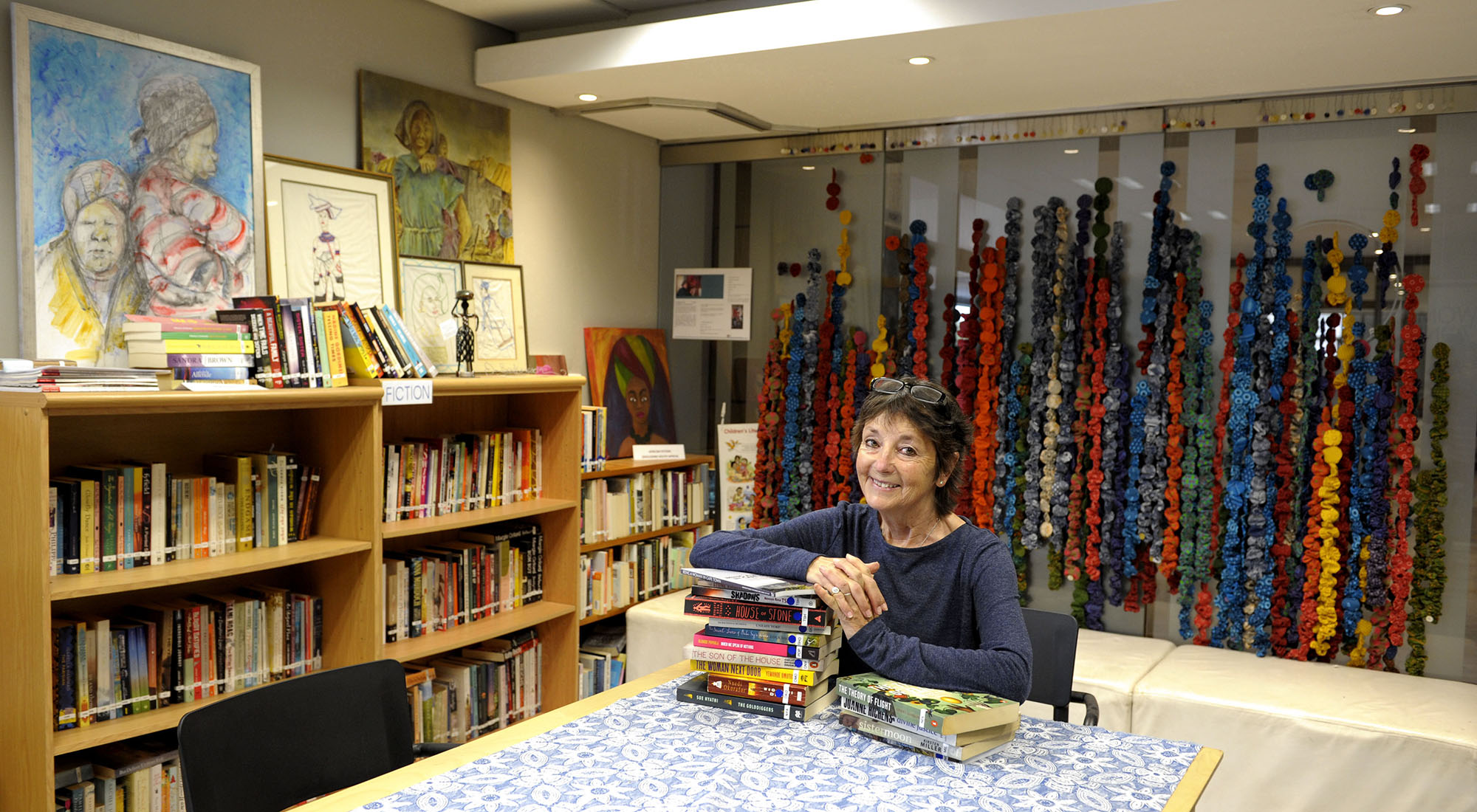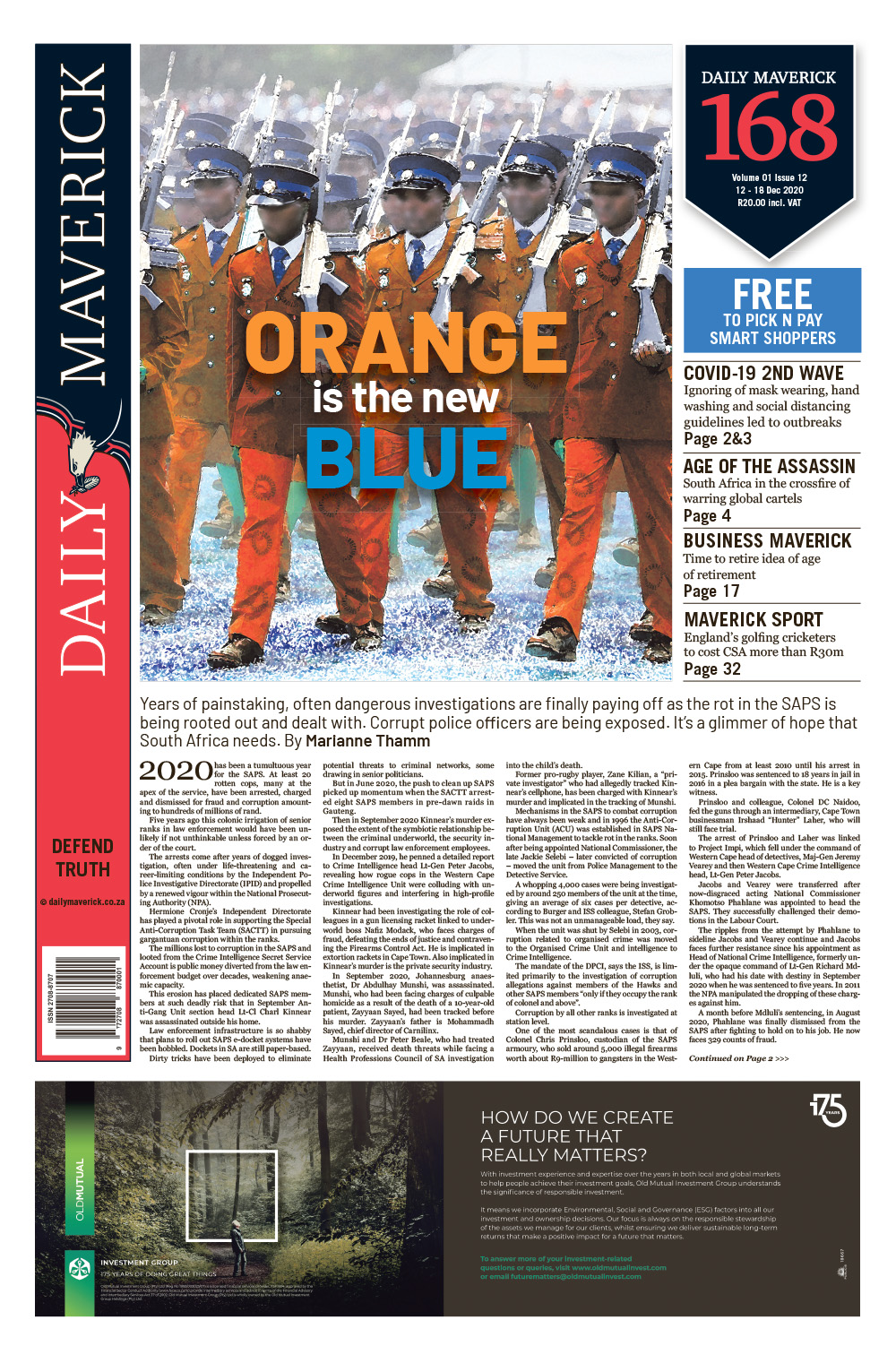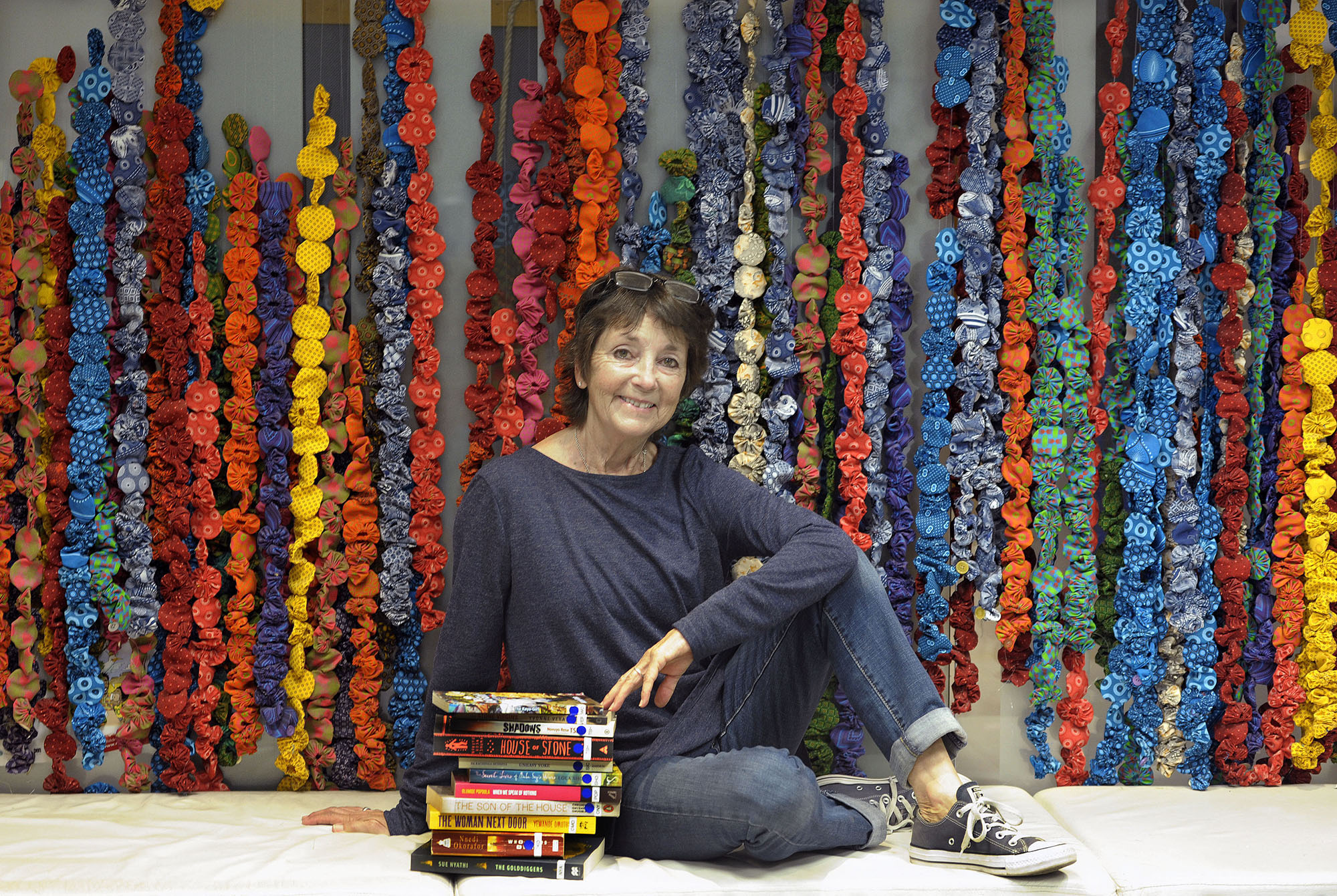“Now this,” says Nancy Richards, unwrapping a book that’s just landed in her postbox as she sees me off from her Mowbray home, “is an activist.” The book is Jwara! Induna’s Daughter by Joyce Notemba Piliso-Seroke.
We had been discussing what an “activist” is. Richards, whose name and voice are familiar to many South Africans, is a freelance journalist and, for more than two decades, presented a woman’s show in its various incarnations on SAfm, as well as presented SAfm Literature for many years.
But this is not what qualifies her as one of our Disrupters. It’s her work as the founder of Woman Zone CT, a non-profit organisation she started with a diverse group of women at The Kitchen (the famous, but now lost-to-Covid, restaurant of Karen Dudley) eight years ago. Woman Zone’s mission is to bring together women from across Cape Town to share their stories.
This is not, perhaps, the stuff of headlines. No one related to Woman Zone has gone to prison or had their offices firebombed. They have not been sued, nor have they made presentations in Parliament to change unjust laws.
“Now Ashley Kriel, Shirley Gunn – those are activists,” Richards emphasises, and I see that she associates activism with the kind of courage that allows some people to continue fighting for justice in the face of guaranteed state violence that will try and often succeed in silencing them.
Perhaps it is because of our violent past, in which lives lived in opposition to apartheid were easily snuffed out by lowly apartheid apparatchiks, that South Africans associate the word “activist” with danger. But the word simply means a person who works in an organised and active way towards a goal. An activist is a reformer who wants to change something in order to improve things.
“I’m not trying to change something that is bad. I’m just trying to open space for a bit of kindness, a bit of listening. To give people space. Women, in particular, desperately need space. What Woman Zone actively does is give people a place to be heard, and I don’t know that that is really activism. It’s passive activism, perhaps...”
Storytelling is an ancient human activity, a binder-together of family and clan, a means of sharing information and embedding memory for future generations.
In a book called Being a Woman in Cape Town: Telling Your Story – which is in a way a record of Woman Zone’s own creation story – journalist and activist Zubeida Jaffer writes that “stories of time gone by shape the present” and says her great-grandmothers, grandmothers and mother, born in the Cape, understood that they were “legally less”.
“They understood that they had to step off the pavement and give way to a white man or woman. I grew up with these stories and it provided me with a picture of myself that suggested that I was less and other.” She makes a case that when all the women of Cape Town tell their own stories, it gives them an opportunity to “hold their heads high and not step off a pavement for anyone”.
“Stories” might seem a nebulous thing to try to pin transformation on, but their power has been studied widely and their potency is evident in everything from psychology and history to entertainment in the form of audio, video and written material to kitchen-table tales of family shame and glory.
When women come together at the intimate Woman Zone venue, a Women’s Library in Artscape Theatre Centre, the stories arrive with them, and they tumble out disjointed, redacted, stuttering. Or they flow out through crafted poems or short stories. Or they arrive as spontaneous anecdotes. They happen during workshops, panel discussions and readings. You can see the stories giving shape to people’s lives. You are witness to individual resilience even as you are witness to the storyteller’s witnessing of her own resilience.
To watch people tell their stories is to watch transformation happen. Richards believes the transformation has more to do with a kind of two-way street of communication rather than only the simple act of speaking to other people.
Speaking is one thing. Being heard is a precious rarity. “Friends don’t always listen. Partners don’t listen. Children don’t listen. To give one another a listening space – it’s so undervalued... And to receive someone’s story, well, that’s an honour.”
 Nancy Richards started Woman Zone CT as a home for the stories of the women of Cape Town. The library is full of books for women, written by women. Behind her are some of the shweshwe “yoyo’s” for The Everywoman Project, which will culminate in an artwork everyone has been a part of. (Photo: Joyrene Kramer)
Nancy Richards started Woman Zone CT as a home for the stories of the women of Cape Town. The library is full of books for women, written by women. Behind her are some of the shweshwe “yoyo’s” for The Everywoman Project, which will culminate in an artwork everyone has been a part of. (Photo: Joyrene Kramer)
Richards might argue that her work isn’t revolutionary, but her dedication to the unassuming simplicity and quiet power of women sharing their stories is in its own way a kind of soft-shoe radicalism. Her interest in the telling of stories stems from her own stumbling efforts at understanding South Africa. Richards arrived in SA from London with her then boyfriend (now husband) by ship in the mid-1970s for what she thought would be a shortish adventure. She applied for a job at Fairlady and was interviewed by the doyenne of South African magazines, Jane Raphaely (“highly pregnant with her son and wearing a Laura Ashley dress”), who gave Richards a job based on three qualities: she’d worked in London, she could drive and she could type. What followed was many years of working with some of the most iconic women in SA.
“I was in a white-women enclave and I was amazed at these women with such strong voices and such strong opinions, and that they were doing things... Here the women I met seemed to be fighting for a lot of things and it wasn’t just for the voice of women, but for the voice of all the unheard.
“When you change countries, you have to shed layers and take on layers. After a year of being here, I thought ... I’ve got it, I see what’s going on here and after five years I thought, sjoe, I don’t know what’s going on here. It was difficult to relate to people who had been living here and had attitudes about apartheid. I didn’t really know what I felt. I was not in the townships. I was not part of the struggle. There was no television when I got here. Newspapers were ... skewed. I just didn’t know what was going on. I mean, none of this is an excuse, but it took a while for the whole ghastliness to sink in and for me the only way of finding the truth was through the women I knew and worked with.”
But then she discovered something called “Let South Africa Speak”.
“It was not a great big thing, but people were getting together, saying, ‘We need to talk among one another’. I went to one of these meetings, and it was just men. But I saw one woman ... and I sat down next to her. As we chatted, we realised we were both there for the same reason: what am I going to tell my children about this country? That was the first time I realised that the only person you can really talk to is another woman. It’s the only way to deal with this whole thing.”
“This whole thing” is both a vague and a very succinct way of describing the heterogeneous conundrum of SA’s past and present.
She and the woman she met that night are still friends. Richards is like that, drawing people to her instantly. It’s easy to see why. Her interest in whoever is before her is entirely authentic. She is one of those rare people who, when she asks how you are, seems to truly want to know how you actually are.
I ask her whether getting women together to tell their stories is a nod towards the now somewhat outdated concept of “reconciliation”.
“The ethic is simply: let’s talk. There’s no goal or higher ideal. If we hear one another speak, we can stop making assumptions about other people. I am white. You can’t not be what you are. Once or twice, there have been uncomfortable moments where I’ve thought, ooh, what’s going on here, but then we address it and try to diffuse it right there.”
Philippa Namutebi Kabali-Kagwa, a professional storyteller who is on the Woman Zone’s team, has a chapter in the Being a Woman in Cape Town book in which she gives pointers on how to tell a story. In it, she quotes Barbara Deming as saying “the longer we listen to one another – with real attention – the more commonality we will find in all our lives. That is, if we are careful to exchange with one another life stories and not simply opinions.” This, Kabali-Kagwa concludes, is what gets done at Woman Zone.
Richards says that in her experience on the radio of listening to women over the years, she has come to the conclusion that there are three ways stories happen. There is the “I have to tell you what’s just happened, it’s so awful” story, which is about “getting it out”. Then there is the “I’m going to tell you this story because I need to think about it” and then there’s the “I’m going to tell you this story because I’ve thought about it”. The last one is often the most engaging one, as it’s one that shows what the teller has gained.
Apart from the story-sharing sessions, panel discussions, launches, the Women’s Library and their Book Club, Woman Zone runs the popular annual Women’s Humanity Walk in conjunction with Artscape, a peaceful demonstration led by women religious leaders of different faiths. They have also, in the age-old way of women, got together sewing circles.
Richards’ vision is that people will start their own Woman Zone circles in other places. Her leadership of the Woman Zone is so open that anyone who arrives with an idea is allowed to run with it, provided it fits into the organisation’s simple ethic of sharing and listening and promoting women’s achievements. The core team has remained stable for many years and while women come and go, there’s a lot of coming back, and a lot of loyalty.
Woman Zone ticks along year after year, providing an almost underground haven for old and young women, and poor and rich women, and women who are broken and women who are whole. And while so many of the stories involve gender-based violence or terrible hardship, or both, the single binding element seems to be some level of triumph, Because overcoming difficulties is part of the collective female narrative.
The transformation of an event, or several events, from the searing moment of its appearance to a story with a beginning, middle and end, is a creative act. It puts something new in place. It destabilises the status quo, it shucks off old and no-longer-useful things, and it imagines new orders.
It’s about as bad-ass as any other kind of activism. And Richards and the rest of the Woman Zone team have quietly gone about practising it month after month for eight years. DM168
With the Women’s Library in Artscape closed since lockdown, like everyone else Woman Zone has taken its story-sharing to the ether, with a podcast series called Woman Zone Stories.





 Nancy Richards started Woman Zone CT as a home for the stories of the women of Cape Town. The library is full of books for women, written by women. Behind her are some of the shweshwe “yoyo’s” for the The Everywoman Project, which will culminate in an artwork everyone has been a part of.
(Photo: Joyrene Kramer)
Nancy Richards started Woman Zone CT as a home for the stories of the women of Cape Town. The library is full of books for women, written by women. Behind her are some of the shweshwe “yoyo’s” for the The Everywoman Project, which will culminate in an artwork everyone has been a part of.
(Photo: Joyrene Kramer) 